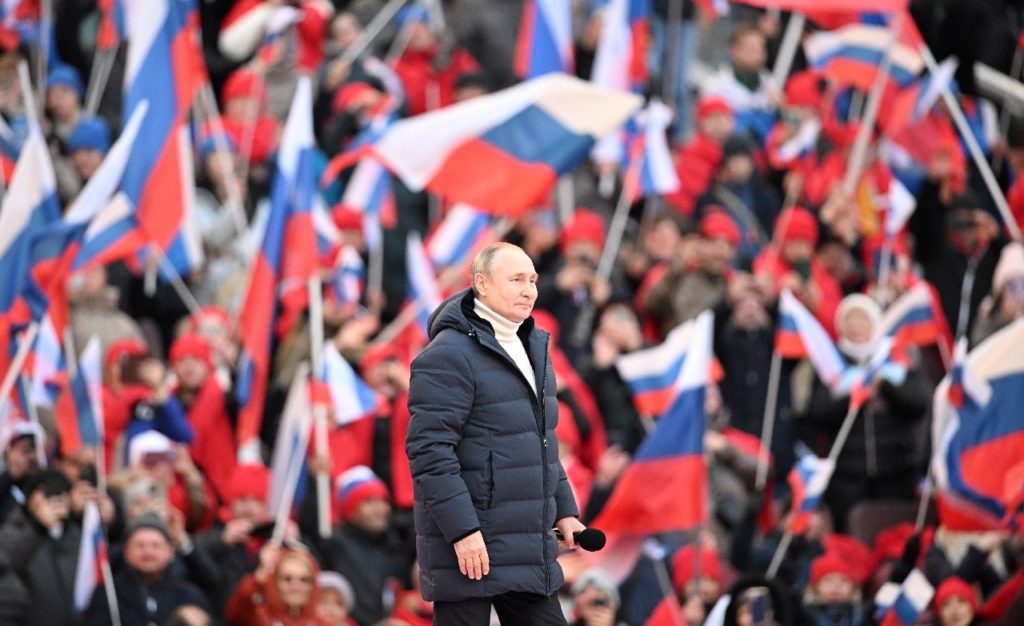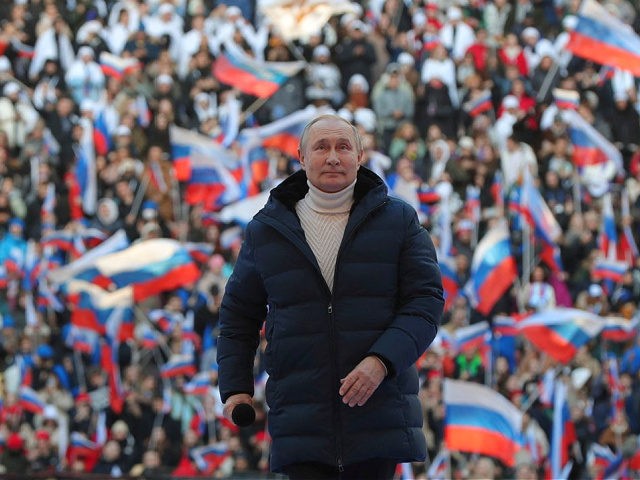Russian President Vladimir Putin hosted a rally at Moscow’s Luzhniki Stadium on Friday to mark the eighth anniversary of Russia’s annexation of Crimea, Ukraine, the Kremlin’s official presidential press service reported.
Russia invaded Ukraine in 2014, seizing the Crimean Peninsula and occupying it for the past eight years. That year also marked the beginning of a conflict between Ukrainian forces and pro-Russian separatists in the Donbas region that escalated into a full-scale invasion of Ukraine by Russia in February.
Video footage of the March 18 event showed what appeared to be a packed venue, meaning tens of thousands of people attended the rally as Luzhniki Stadium has a capacity of 81,000.
Putin addressed the massive crowd from a platform in the stadium’s center, explaining he organized the gathering to coincide with Russia’s annexation of Crimea from Ukraine on March 18, 2014.
“On our land, united by a common destiny — this is what people probably thought and were guided by when they went to the referendum in Crimea and Sevastopol on March 18, 2014. They lived and live on their own land and wanted to live a common destiny with their historical homeland — with Russia. They had every right to do so and achieved their goal,” he said.
Putin detailed Moscow’s reasoning for annexing Crimea — a peninsula connected to southern Ukraine along the Black Sea’s northern coast — in 2014. He reiterated previous claims by the Kremlin that the peninsula’s Russian population suffered from anti-Russian persecution by extreme Ukrainian nationalists and “neo-Nazis.” Russia claims that Crimeans chose to become part of Russia through a referendum; much of the free world rejected the referendum as occurring under duress and illegitimate.
“The fact is that the Crimeans and Sevastopol residents did the right thing when they put a hard barrier in the way of neo-Nazis and extreme nationalists. Because what happened in other territories and is still happening is the best confirmation of this,” the Russian president said. Putin has repeatedly claimed since the military escalation in February that Ukraine’s government — whose president, Volodymyr Zelensky, is Jewish — is run by “Nazis.”
He then referenced an alleged “coup d’état” Moscow claims was carried out in Ukraine in early 2014 with support from the U.S. government. The development saw Ukraine’s Russian-backed president at the time, Viktor Yanukovych, flee the country after months of protests in the heart of Kyiv objecting to his attempts to distance Ukraine from Europe and the greater West. The president who succeeded Yanukovych, Petro Poroshenko, lost to Zelensky in a free and fair election in 2019, but the Russian government insists on branding Zelensky’s administration an illegitimate extension of the alleged “coup.”
“People who lived and live in the Donbas also did not agree with this coup d’état,” Putin recalled on March 18 during his stadium rally in Moscow.

Russian President Vladimir Putin attends a concert marking the eighth anniversary of Russia’s annexation of Crimea at the Luzhniki stadium in Moscow on March 18, 2022. (Photo by RAMIL SITDIKOV/POOL/AFP via Getty Images)
“Punitive military operations were immediately organized against them, and not one, they were immediately plunged into a blockade, subjected to systematic shelling from cannons, air strikes — this is all what is called ‘genocide,'” he said.
“It is to save people from this suffering, from this genocide — this is the main, main reason, motive and goal of the military operation that we launched in the Donbass and Ukraine, this is precisely the goal,” the Russian president acknowledged.
Putin referenced Russia’s latest war with Ukraine, which he describes as a “special military operation.” Moscow launched an air and ground offensive in neighboring Ukraine on February 24. The conflict began just 72 hours after the Kremlin announced plans to formally recognize the independence of two Russian-backed separatist states in eastern Ukraine’s Donbas region known as the Donetsk and Luhansk People’s Republics (DPR and LPR).
The optics of Putin’s event, which appears to indicate widespread support for his actions in Ukraine, follow weeks of nationwide protests against the war. Russian security forces have reportedly arrested over 14,000 people for protesting since February 24 after assemblies occurred in Russia’s largest cities, Moscow and St. Petersburg. Russia’s parliament adopted and put into force two new laws on March 4 that “criminalize independent war reporting and protesting the war [with Ukraine], with penalties of up to 15 years in prison,” Human Rights Watch reported on March 7.

COMMENTS
Please let us know if you're having issues with commenting.